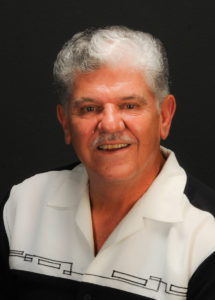
Rodolfo Chávez
Las Vegas, N.M. – School paraprofessionals will have the opportunity to earn English as a second language education degrees at Highlands University and teach in underserved schools, thanks to a $2.2-million U.S. Department of Education grant.
With the five-year grant, 30 ESL paraprofessionals, teaching assistants who work with students, in the Santa Fe and Española school districts will earn their associate degree at Santa Fe Community College and then transfer to Highlands to complete their bachelor’s degrees in education with an ESL endorsement.
The grant, called the 2+2 Career Ladder Teacher Licensure Program, will pay for the paraprofessionals’ tuition, books and related professional development.
“There’s a very high need for ESL teachers to work with the growing number of English language learners in elementary schools in Santa Fe and Española,” said Highlands University’s Rodolfo Chávez, who wrote the grant and is its project director. “The fundamental goal of the grant is to ensure equity, access and excellence for all students. We will prepare ESL paraprofessionals to become exceptional teachers who provide high-quality instruction to students.”
Chávez said this instruction will give English language learners a bilingual opportunity to enter a global society equipped with two languages, and a solid educational background that respects their cultural identity and prepares them to succeed.
Chávez is a senior associate with Highlands University’s Center for the Education and Study of Diverse Populations. Founded in 1991, CESDP is an educational diversity center that provides professional learning for teachers, administrators and families.
The ESL paraprofessionals will take classes from Highlands University School of Education faculty at either the university’s Santa Fe Center in the Higher Education Center in Santa Fe or the CESDP office in Española.
“This new grant relies upon a ‘grow your own’ model where 30 existing bilingual ESL paraprofessionals are recruited, mentored and supported until they complete their B.A. in education from Highlands, along with their teaching license and ESL endorsement,” Chávez said.
He said the grant funding also calls for recruiting and selecting 30 tenured teachers from the Santa Fe and Española school districts to serve as mentors for the paraprofessionals.
“This unique mentorship component is important because the seasoned teachers will help the paraprofessionals meet the academic and linguistic needs of their English language learner students while also providing ongoing encouragement and support,” Chávez said.
The U.S. Department of Education’s English Language Acquisition Department awarded only 49 National Professional Development grants from 337 applicants nationwide. Among the 49 grant recipients, Highlands was ranked third for the quality of its proposal.
Chávez earned his Ph.D. in social foundations of education from the University of Colorado-Boulder. He taught on the education faculty at CU-Boulder and Arizona State University before joining the Highlands Center for the Education and Study of Diverse Populations in 2003.
“At CEDSP, we exist to ensure that Hispanics, Native Americans and other populations have an opportunity to strive and succeed in Northern New Mexico communities,” said Chávez, who is past president of the National Association for Bilingual Education.
At Highlands, Chávez has competed successfully for a number of U.S. Department of Education grants. In 2012, he secured a $1.7-million grant for 120 teachers in Northern New Mexico to complete their master’s degrees in the Highlands School of Education.
Javier Arellano is a math and science teacher at Ojo Caliente Elementary School in the Mesa Vista School District who completed his M.A. in curriculum and instruction from Highlands through the grant.
“The master’s degree gave me an advanced understanding of using assessment data to teach math and science concepts more effectively,” Arellano said. “My students are excelling with their test scores, exceeding district and state norms. This CEDSP grant program was an amazing opportunity for a rural teacher like me to advance my education.”
Chávez said that in addition to advancing their education, the new grant will significantly boost the lifetime income for the school paraprofessionals.
